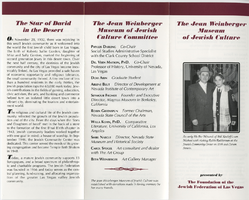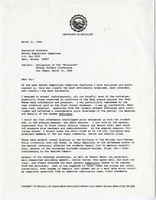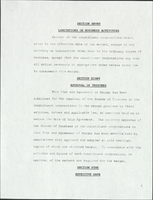Search the Special Collections and Archives Portal
Search Results
Audio clip from interview with Al Levy by Cheryl Caples, February 23, 1979
Date
Archival Collection
Description
Part of an interview with Al Levy on February 23, 1979. In this clip, Levy discusses his childhood, living in Las Vegas, and his experience at Las Vegas High School.
Sound
Audio clip from interview with Lynn Leshgold Rosencrantz by Barbara Tabach, January 7, 2016
Date
Archival Collection
Description
Part of an interview with Lynn Leshgold Rosencrantz on January 7, 2016. In this clip, Rosencrantz discusses relocating to Las Vegas and teaching education.
Sound
Audio clip from interview with Judith Steele, November 24, 2014
Date
Archival Collection
Description
In this clip, Judith Steele discusses celebrating the High Holidays and how she influenced Clark County School District to allow Jewish children to observe these days without their absence counting against their attendence record.
Sound
Audio clip from interview with Freddie Glusman, October 29, 2015
Date
Archival Collection
Description
In this clip Freddie Glusman discusses the restaurant he owned and his charitable giving over the years.
Sound

Transcript of interview with Rabbi Malcolm Cohen by Barbara Tabach, December 16, 2015
Date
Archival Collection
Description
In this interview, Rabbi Malcolm Cohen speaks about observed differences between British and American Jewish communities as well as new Temple Sinai initiatives to build community and engage younger congregants. Rabbi Cohen and his wife have two children, Elijah and Rachel.
Rabbi Malcolm Cohen was born on October 7, 1973 in London, England. He describes having the typical Reform Jewish upbringing of a second generation Londoner. His mother worked as an office assistant, and his father ran a bookshop and also prepared youth for their bar and bat mitzvahs. It was his father?s dedication to Jewish education and service that greatly influenced his career path. After earning a degree in psychology from Southampton University, Rabbi Cohen went on to get a professional qualification in youth and community work. He subsequently became the British Reform movement?s first outreach officer, leading the efforts to engage 20- and 30-year-olds to Judaism. At his wife, Sarah?s, encouragement, Rabbi Cohen enrolled in Leo Baeck College to become a rabbi. Upon finishing his studies in 2006, he got a job at West London Synagogue, a large Reform congregation, where he worked with a team of rabbis. In 2009, Rabbi Cohen took the position as Temple Sinai?s rabbi, where he has served ever since. In this interview, he speaks about observed differences between British and American Jewish communities as well as new Temple Sinai initiatives to build community and engage younger congregants. Rabbi Cohen and his wife have two children, Elijah and Rachel.
Text

Jean Weinberger Museum of Jewish Culture pamphlet, 1996
Date
Archival Collection
Description
A pamphlet for the Jean Weinberger Museum, presented by The Foundation of the Jewish Federation of Las Vegas.
Text

Letter to the Executive Director of the Nevada Humanities Committee from Donald E. Carns evaluating the Holocaust Nevada Student Conference, March 21, 1984
Date
Archival Collection
Description
Letter from Donald E. Carns of the Department of Sociology at UNLV to the Nevada Humanities Committee evaluating the Holocaust Nevada Student Conference held in Las Vegas, March 14, 1984.
Text
Audio clip from interview with Jon Sparer, March 4, 2015
Date
Archival Collection
Description
Part of an interview with Jon Sparer, March 4, 2015. In this clip, architect Jon Sparer discusses his involvement with designing and building the synagogue for Congregation Ner Tamid.
Sound
Audio clip from interview with Louis Wiener, Jr., February 1, 1990
Date
Archival Collection
Description
Part of an interview with Louis Wiener, Jr. on February 1, 1990. In this clip, Wiener talks about how he became the attorney for Bugsy Siegel in the 1940s, and Siegel's desire to protect Wiener from criticism.
Sound

